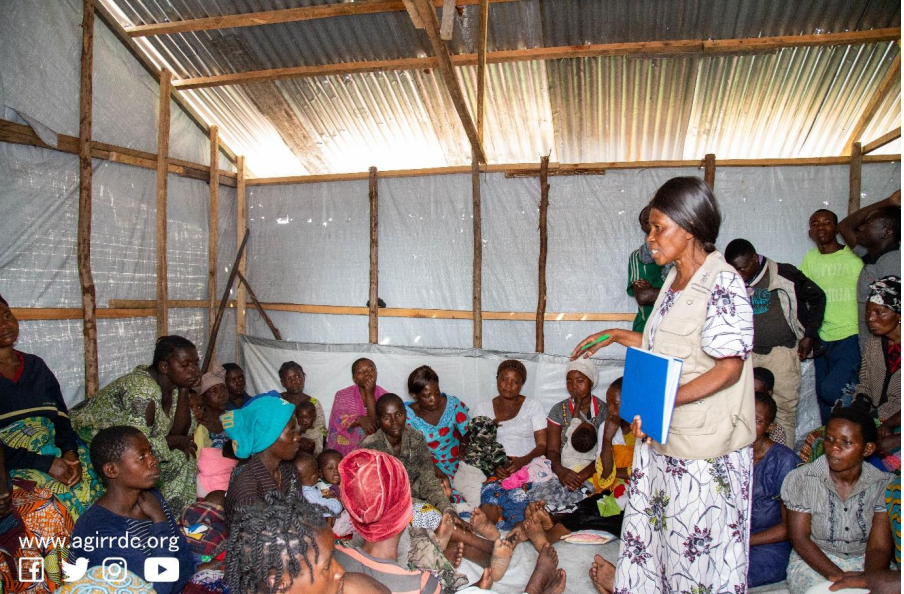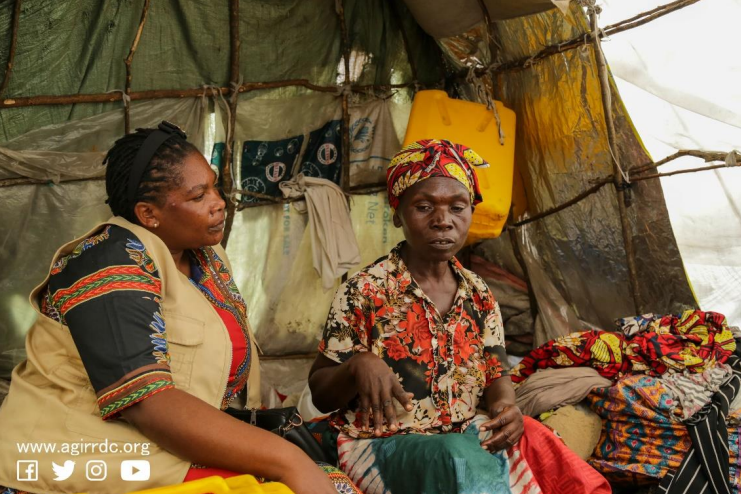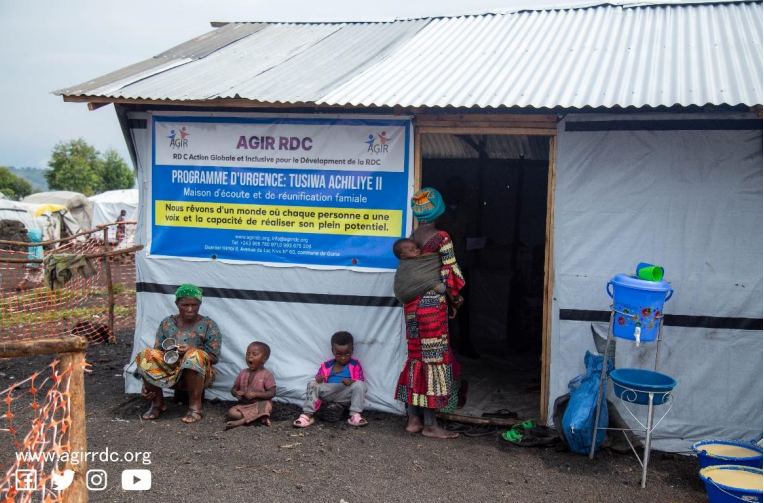
1. Context
There has been no significant improvement from a socio-political-economic-cultural point of view in the region this month of June. Thus, our activities took place in a deleterious security climate, a tense political climate, an overwhelming economic environment apart from a few soothing cultural facts here and there.
Beyond all the challenges related to the security, political, social economic context, the activities of AGIR DRC, have followed the course normally according to its plan by project and objective pursued by the latter.
Administratively, the volunteers were well motivated to accompany the activities throughout the intervention site, with good collaboration with community leaders and the target population.
As part of the advocacy campaign to ratify international conventions (ILO, Article 189) on rights for domestic workers, and specific Congolese national legislation on domestic workers' rights, a convention was organized and brought together local authorities, local and national leaders of domestic workers' associations and domestic workers themselves to discuss UFEDOC's achievements in the protection and promotion of domestic workers' rights in collaboration with national and international partners. The convention also presented new perspectives for promoting the rights of domestic workers, including the signing of the petition that would lead to the legislation of a specific law on domestic workers if the required signatures were gathered.
Thanks to the financial support of CWRD and Intered, we continue our intervention in the Bulengo camp, as part of the second phase of the TUSIWAACHILIYE emergency project. In addition, we carry out other activities related to our permanent projects, mental health, reproductive health and community mobilization components have marked an unimaginable presence that the listening house of AGIR DRC in the camp has become the reference center for all other organizations, a joy and grace for us.
Twa weza shinda II is in its closing phase of training, the evaluation sessions were characterized this month of June with intense practice by masonry learners by building the septic tanks of the center, as well as the national exam in Tailoring for 35 learners.
During the month of June, the volunteer agents and staff of AGIR DRC and its partner UFEDOC took part in two capacitation sessions:
One on International Humanitarian Law which aimed to introduce the concepts of protection and that of international humanitarian law for the staff of AGIR DRC, mainly those of the program and communication for whom the themes are omnipresent in the context of their field work as a humanitarian,
A second focus was first aid training, was organized for the Staff to act in order to be equipped in the management of the first emergencies in the event of an accident. An essential training for all these different actors who are in regular contact with many people.
Our communication and media department ensures media coverage of all the activities of our organization by regularly reporting and documenting the various initiatives on the ground. Field visits were made several times to ensure this media coverage.
1. EMERGENCY RESPONSE : TUSIWAACHILIYE BULENGO II (Let’s not forget Bulengo)
From end January to mid-April, we implemented an emergency project in Bulengo in response to the situation of people displaced by the Rwandan-backed M23 and the DRC loyalist armed forces. Recognizing the continuing needs, we launched a second phase of this emergency project in early June, with a greater focus on informal education, mental health, nutrition, community outreach, sexual and reproductive health, and other holistic actions.
A. Mental Health
In Bulengo camp, we provided support to people displaced by the war through listening, mediation, home visits and clinical follow-up. Our focus has been on the most vulnerable groups, such as pregnant women, breastfeeding women, children, especially those showing signs of malnutrition, women victims of sexual violence, as well as the elderly.
Active Listening
Many individuals are deeply affected by the suffering in the camp, with obvious psychological consequences. In addition, a number of children show clear signs of malnutrition. Through attentive listening sessions, we have managed to identify the real problem and we are now looking at how to find a solution, even if it is limited, to improve the situation of these people.
Therapy Group
This June, we created a focus group with more than 42 people, including men, pregnant women, breastfeeding women, the elderly and parents of malnourished children. This group aims to organize group therapy sessions as well as provide a lot of additional advice and information. (June 14, 2023)
Home Visits
As part of our integrated approach to psychological assistance, we set up home visits for people whose listening and group therapy sessions were not enough to improve their psychological state. We found that some people living in precarious conditions, such as makeshift homes, had additional difficulties in accessing care and finding an environment conducive to their recovery. (June 14, 2023)
The Listening House
To facilitate access to psychological assistance for those displaced by war in the Bulengo camp, we set up a listening house in the heart of the camp in the second half of January. After the end of the first phase of the emergency project, we could not close the doors of this structure because there was still a significant need for psychological follow-up. Indeed, many individuals were at risk of relapse if we stopped the follow-up sessions. For this second phase, we have therefore decided to extend the same activities, as well as other closely related activities, such as focus groups. (June 23, 2023)
Bulengo, June 23, 20203, Dr. Mitterrand on the right listening to a woman from the speaking group after an awareness session on family planning.
Bulengo, June 23, 2023, Dr. Mitterrand on the right guiding a woman from the discussion group after an awareness session on family planning.
Sexual and reproductive health
We have set up several awareness-raising sessions on various topics, such as family planning, the prevention of sexually transmitted infections (STIs) and the importance of HIV testing. During these sessions, we sought to inform and raise awareness among participants on these topics.Regarding family planning, we discussed the different contraceptive methods available and explained their use and effects. We also stressed the importance of consulting a health professional to choose the most appropriate contraceptive method for each person.
Consultation
At the end of each awareness session, many people come to us to share their concerns about their health or the complications they encounter. This is necessary because the other organizations present in the camp treat only a limited number of diseases. We provide them with advice and, if necessary, refer them to appropriate health facilities.
Distribution of hygiene kits and contraceptives
To help women in the discussion groups protect themselves against unplanned pregnancies, we provided contraceptive products and menstrual hygiene products. In addition, to protect all members of the discussion group, we also distributed condoms to prevent sexually transmitted infections.
2. Community mobilisation
We have organized awareness-raising activities on various topics such as the importance of hygiene and disease prevention. We have also conducted awareness-raising campaigns on the fight against gender-based violence, to promote equal opportunities for women and men in terms of decision-making and power. In addition, we organized awareness-raising sessions on peaceful coexistence and the culture of peace. in the camp, as well as on the health of nursing mothers.
Bulengo, 15 June 2023, Esther Abumba leading an awareness session for a member of the Bulengo IDP discussion group with great attention on the subject of peace.
3. Informal education
We favoured an informal education approach with the children, using songs, games and animations to help them remember the subjects they learned in school before the war. We taught and recalled concepts such as the alphabet, conjugation and many other topics of the primary school curriculum

The team
We work with young volunteers from the city of Goma who believe in the action of AGIR RDC and who are driven by a humanitarian heart. They are very committed to working with those displaced by war and work with heart in preparing and serving the food, community mobilization, informal education and many other tasks.
Many come to register to be part of the team, be part of a new type of action never seen in Goma before: student, choir, hairdresser, slammer, mother of family all say “it is our duty, thank you for making it possible”
Mugunga, June 15, 2023, Modestine, Chief Executive at AGIR DRC on the left and Ghislain the Head of Mobilization within AGIR DRC doing a first aid practice
G. TWAWEZA SHINDA 1
It has been almost a year since the Twaweza shinda I project ended, but entrepreneurial activities and focus group meetings continue. Almost all members of these three groups have already started an income-generating activity and continue to save in their savings groups.
MEETING AND TRAINING
On 15 and 16 June 2023, AGIR-RDC staff, in particular field workers, volunteers and those regularly involved in emergency projects, underwent first aid training. This training was organized to strengthen the skills of the participants in first aid and emergency management. Participants learned basic first aid techniques such as cardiopulmonary resuscitation (CPR), hemorrhage and fracture management, and emergency management such as natural disasters and road accidents.











